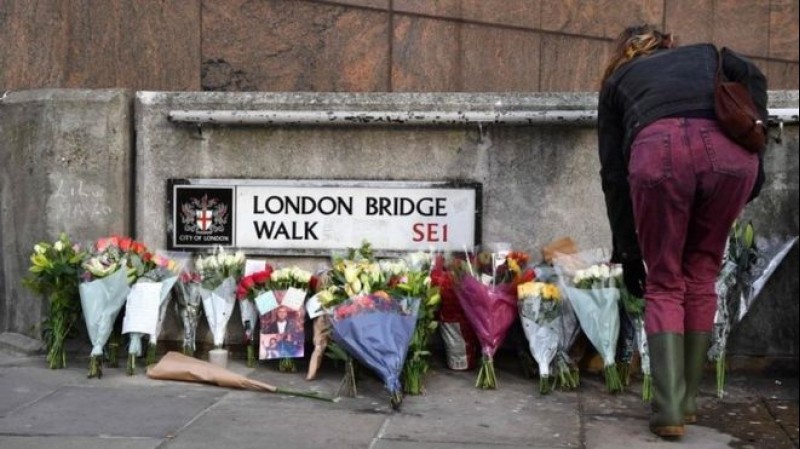- Home/
- News
London Bridge Attack: Usman Khan completed untested rehabilitation scheme
London Bridge attacker Usman Khan attended two counter-terrorism programmes that had not been fully tested to see if they were effective, BBC News has discovered.
Khan, who was convicted of a terrorism offence in 2012, killed Jack Merritt, 25, and Saskia Jones, 23, on Friday.
He had completed two rehabilitation schemes during the eight years he spent in prison and following his release.
The government says such programmes are kept "under constant review".
Three others were injured after Khan launched the attack at a prisoner rehabilitation event inside Fishmongers' Hall near London Bridge.
Inquests into the deaths of Mr Merritt and Ms Jones were opened and adjourned at the Old Bailey on Wednesday.
The court heard that both of them died after being stabbed in the chest. The date for the full inquests is still to be decided.
City of London senior coroner Alison Hewitt also opened and adjourned the inquest into Khan, who died from multiple gunshot wounds after being shot by police.
The inquest heard that Khan had been at the venue to participate in group workshops.
During his time in prison, Khan completed a course for people convicted of extremism offences and after his release went on a scheme to address the root causes of terrorism.
The first course Khan went on, the Healthy Identity Intervention Programme, was piloted from 2010 and is now the main rehabilitation scheme for prisoners convicted of offences linked to extremism.
Last year, the Ministry of Justice published the findings of research into the pilot project which found it was "viewed positively" by a sample of those who attended and ran the course.
However, the department has not completed any work to test whether the scheme prevents reoffending or successfully tackles extremist behaviour.
There has also been no evaluation of the impact of the Desistance and Disengagement Programme, which Khan took part in after his release last year.
Government officials pointed out that the schemes have not been operating for long enough for the results to be assessed, but a spokesperson said all offender behaviour programmes were kept under constant review.
The spokesperson said: "All our offender behaviour programmes are monitored, evaluated and kept under constant review to ensure that they are effective in reducing reoffending and protecting the public."
The Home Office "fact-sheet" on the Desistence and Disengagement programme contains eight pieces of "key information".
But it omits the really key bit - that the programme has never been evaluated. In other words, we do not know if it works.
The same is true of the Healthy Identity Interventions course. Although the Ministry of Justice conducted a "process evaluation", to check the pilot version was being run properly, we will not know for another two years if it is achieving results.
So, these schemes, like many other offender behaviour projects, are, in essence, experimental.
Some say the only way of knowing if they are any good is to try them out. Others argue the risks of doing that are too high, pointing to the once-flagship Sex Offender Treatment Programme, which was used for 25 years until research showed that it increased the likelihood of reoffending.
Rehabilitating convicted terrorists is as complex and challenging as it gets - but a little more openness and honesty is required about the methods that are being used.
Khan, 28, was arrested in December 2010 and sentenced in 2012 to indeterminate detention for public protection with a minimum jail term of eight years, having pleaded guilty to preparing terrorist acts.
He had been part of an al-Qaeda inspired group that considered attacks in the UK, including at the London Stock Exchange.
In 2013 the Court of Appeal quashed the sentence, replacing it with a 16-year fixed term, and ordered Khan to serve at least half this - eight years - behind bars.
Since his release from prison in December 2018, Khan had been living in Stafford and was required to wear a GPS tag.
Khan was armed with two knives and was wearing a fake suicide vest during the attack at Fishmongers' Hall in the City of London on Friday.
He was tackled by members of the public, including ex-offenders from the conference, before he was shot dead by police.
Source: Link



 Development of specialized PCVE web site is funded by EU FUNDS CN 2017-386/831 - "IPA II 2016 Regional Action on P/CVE in the Western Balkans"
Development of specialized PCVE web site is funded by EU FUNDS CN 2017-386/831 - "IPA II 2016 Regional Action on P/CVE in the Western Balkans"